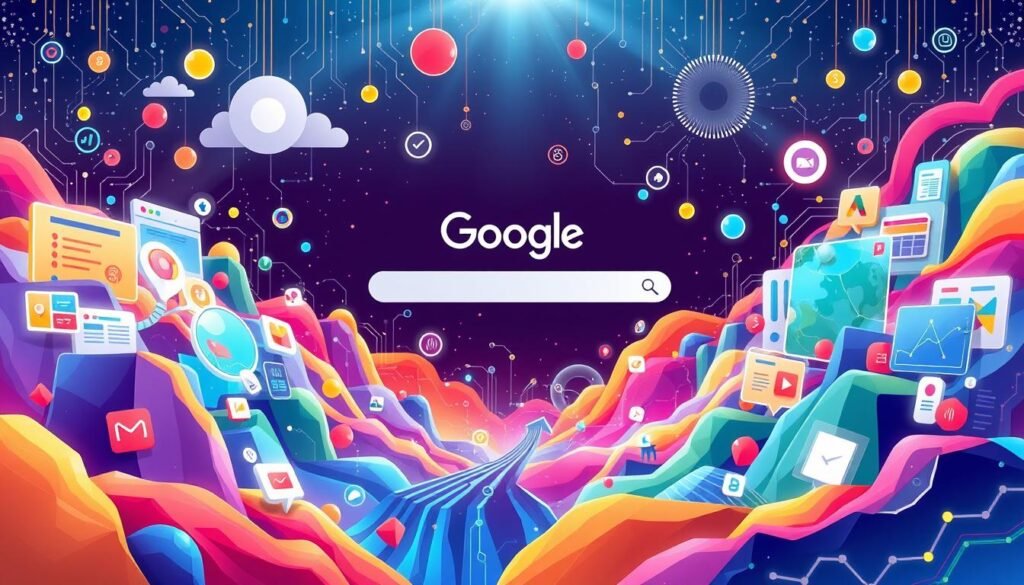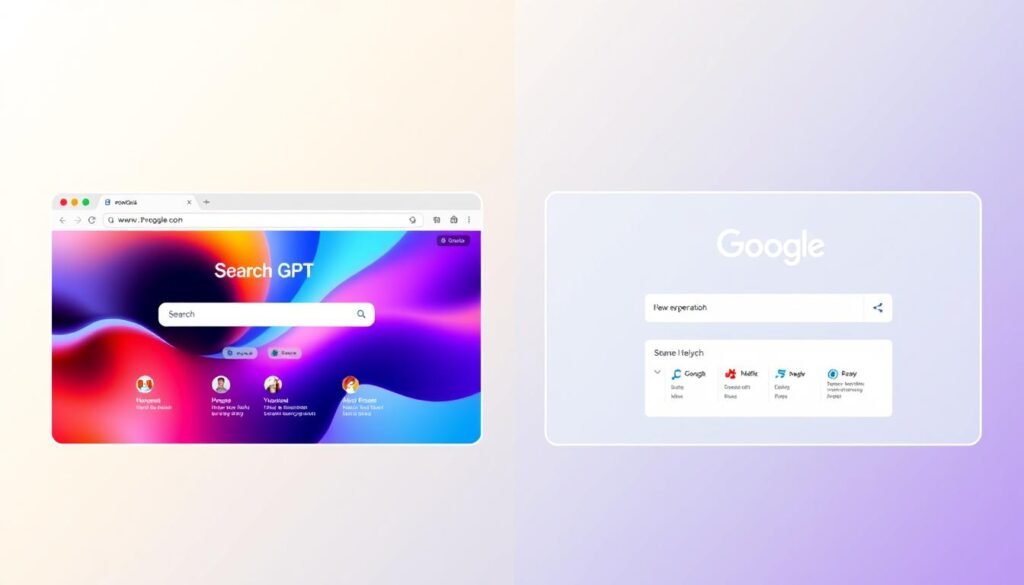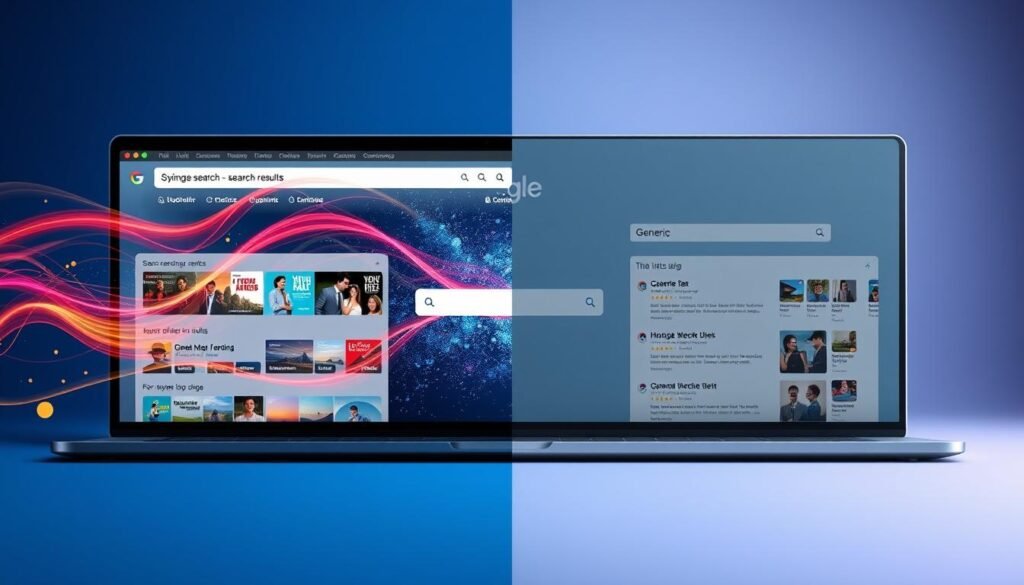Did you know Google powers 90% of all searches worldwide? It’s a big lead in the search engine market1. But, a new AI tool called Search GPT is making waves. It was created by OpenAI and has already reached 100 million users in just 2 months1.
Search GPT is different from Google Search. It uses advanced AI to understand what you’re really asking. This means it gives you answers that are more personal and direct2. Google Search, on the other hand, gives you lots of results but might not always get the context right2.
Search GPT also does things Google Search can’t. It can debug code, write poetry, and even help with travel plans1. This makes it stand out from Google’s traditional search experience1.
Key Takeaways
- Google remains the dominant search engine, powering 90% of all searches worldwide.
- Search GPT, an AI-powered search tool, has quickly gained popularity, crossing 100 million users in just 2 months.
- Search GPT utilizes advanced natural language processing to provide more personalized and contextual search results.
- Search GPT offers unique features beyond traditional search, such as code debugging, poetry writing, and contract drafting.
- Google Search excels at delivering a wide range of search results, while Search GPT focuses on relevance and quality.
Understanding Search GPT Technology
Search GPT is a new search technology that challenges Google. It was developed by OpenAI. This advanced model is changing how we find information online3.
What is Search GPT?
Search GPT is a next-generation search tool. It uses GPT-3 integration and contextual understanding for personalized searches. Unlike old searches, it gets the real meaning behind what you ask, giving you better results3.
Key Features of Search GPT
Search GPT can answer follow-up questions and improve its answers as you talk. You can dive deep into a topic, asking more questions and getting answers that fit the conversation3. Its design is simple and focused on finding what you need quickly, without clutter3.
It also focuses on quality content from trusted sources. This means you get reliable information, not just ads3.
As Search GPT grows, it will compete with Google. It’s promising, but it needs to win people over and keep giving accurate results3.
“SearchGPT offers a conversational search experience, not just keyword searches.”
Search GPT is a big step in semantic search and contextual understanding. It could change the search engine world. Watching how it develops and challenges Google will be interesting3.
| Feature | Search GPT | Google Search |
|---|---|---|
| Search Approach | Conversational, semantic search | Keyword-based |
| User Interaction | Allows follow-up questions and refinement | Traditional query-response format |
| Interface Design | Streamlined, focused on efficient search | Cluttered, with sponsored content |
| Content Prioritization | Emphasis on quality journalism and creator content | Algorithm-driven, can prioritize sponsored content |
Search GPT is changing the search world, challenging Google. Its semantic search and contextual understanding are new. It will be exciting to see how it changes searching for things online3.
Exploring Google Search
Google Search has been a top search engine for nearly a quarter of a century4. It uses complex algorithms and a huge index of web pages to find what you need fast5. Unlike newer AI chatbots like ChatGPT, Google Search looks through billions of web pages for answers5.
Key Features of Google Search
Google Search is known for its accurate and consistent results5. It’s great for finding business hours, directions, or the latest news. It also has apps like Google Maps and Google Drive to help with different tasks5.
Google’s search algorithm changes often. It looks at many things to decide if a web page is good or not4. These things include traditional keyword matching, Google’s ranking system, and web crawling4.

ChatGPT is known for its language skills5. But Google Search is better at advanced searches and giving reliable info5. The fight between old-school search and AI search is ongoing, with each having its own ups and downs4.
“Google Search retrieves information from billions of web pages using algorithms, while ChatGPT uses deep learning and a transformer architecture to provide human-like responses.”
The digital marketing world relies a lot on search engine optimization (SEO)4. The rise of AI like ChatGPT could shake things up. But Google keeps investing in AI, like BERT, to stay ahead4.
In the changing world of search, Google Search and AI tools like ChatGPT have their good and bad sides5. It’s key to know what each can do to choose the best for your search needs56.
User Experience: Search GPT vs Google
Search GPT and Google have different ways of interacting with users. Search GPT offers a conversational interface. This lets users have a dialogue, ask more questions, and build context over time7. Google, on the other hand, has a traditional search format with a simple search box and a list of results7.
Interface and Interaction
Search GPT aims for a clean, ad-free experience. It feels like talking to a knowledgeable assistant7. It’s great at handling complex searches and giving detailed answers7. Google’s results, though, include more than just web links. They also have YouTube videos, social media posts, and shopping options7.
Response Styles
Google shows more information in its results7. But Search GPT gives direct, concise answers. Its conversational style makes it easier to find what you need8. Yet, it might not always give accurate or sourced information8.

Choosing between Search GPT and Google depends on what you need7. If you want a simple, conversational search experience, Search GPT might be better. But if you need more information and options, Google is the way to go78.
Search Results and Relevance
The search world is changing fast, showing the big difference between AI answers and old search algorithms9. Search GPT gives detailed answers, unlike Google’s focus on keywords9. It looks at what people really want, not just keywords9.
Google’s ranking system is getting better but is all about keywords9. But Search GPT is all about understanding what users really need9. It gives one clear answer, not a list of links9.
How Search GPT Generates Answers
Search GPT uses AI to get what you really mean and need9. It mixes info from many places to give you a complete answer9. This shows how important it is to make content that AI can understand9.
Unlike Google, Search GPT looks at the whole question, not just keywords9.
Google’s Ranking System
Google’s system is complex, looking at keywords, site trust, and how users interact9. It tries to give you lots of options to meet different needs9. But Search GPT sees things differently, using what people say online to judge trustworthiness9.
| Characteristic | Search GPT | Google Search |
|---|---|---|
| Response Style | Single, complete answer | Diverse set of search results |
| Authority Measurement | Online consensus and sentiment analysis | Backlinks and domain authority |
| Content Optimization | Focus on natural, helpful content | Keyword optimization strategies |
| Data Sources | Wide range of online sources, including social media and reviews | Extensive web page indexing |

Search GPT and Google Search show how search tech is changing9. AI answers are becoming more common, changing how we find information9. Knowing these differences helps us use each platform better to find what we need9.
Personalization and User Data
Search GPT and Google have different ways of handling personalization and user data. Search GPT focuses on the current conversation, which might be better for privacy1. Google, on the other hand, uses a lot of user data to make search results more personal1. This difference could affect how private our searches are and how well they match our interests.
Search GPT’s Approach
Search GPT wants to make searches personal without invading privacy. It looks at the current conversation to give relevant results without needing to track users1. This method is good for those who worry about their online privacy and want fair data use.
Google’s Use of Data
Google uses a lot of user data to make searches better. It knows a lot about what we search for and where we are, which helps it give us personalized results1. But, this has made some people and regulators worry about how much data Google collects and how it affects our privacy.
Google’s use of data has made searches better, but it has also started a debate. People are talking about how to balance making searches personal with keeping our data private110. As search technology gets better, we’ll see more about how to handle user data and privacy.

“The battle for search engine supremacy between Google and Search GPT presents possible changes and new ideas in the search world.”11
The way Search GPT and Google handle personalization and user data will shape the future of search11. Finding a balance between making searches personal and keeping them private will be key. These search platforms will try to meet the changing needs and wants of users.
Use Cases: When to Use Each
Both Search GPT and Google Search are great for different things. Knowing when to use each can help you find what you need faster12.
Ideal Scenarios for Search GPT
Search GPT is perfect for tricky questions that need a deep understanding. It’s also great for getting quick answers without looking through many links. It’s useful for searches that might lead to more questions12.
It gives clear, relevant answers, which is great for complex topics12. Its chat-like interface makes searching fun for those who like talking to their search engine12.
When to Rely on Google Search
Google Search is better for finding specific websites or local info. It has billions of web pages12 and lets you customize your search. It’s good for many types of searches.
While Search GPT is good for direct answers, Google Search is better for seeing many views or the newest info13. Google’s easy-to-use design and huge index are big pluses in some cases12.
Choosing between Search GPT and Google Search depends on your search needs. Each has its own strengths. Knowing these can help you pick the best tool for your search tasks.
Limitations and Challenges
Search GPT and Google Search have their strengths, but they also have limits. Knowing these can help users use them better. It’s important to understand these to make smart choices about when to use each.
Limitations of Search GPT
Search GPT relies on old data, which might not have the latest info14. It shows fewer results than Google, which can make searches less thorough14. Also, it often uses the same sources, leading to too much of the same info14.
It can also spread biased content because of its training data15. This can include stereotypes or wrong facts15. Sometimes, its answers might not make sense or be off-topic15.
Challenges with Google Search
Google Search is usually reliable but has its own challenges. The web is getting more complex, and ads can influence what it shows14. It also uses personal data, which raises privacy concerns.
Both Search GPT and Google Search struggle with false information15. This is hard in today’s world where fake news spreads fast.
In summary, Search GPT and Google Search have their own strengths and weaknesses. Knowing these can help users choose the right tool for their searches1415.
Future of Search Technologies
Search is changing fast, thanks to AI and new search engines16. For over 20 years, Google has led the way16. But now, new AI like ChatGPT is shaking things up16.
Innovations in Search GPT
Search GPT uses advanced AI to change how we search16. It’s better at understanding natural language than old search engines16. It gives detailed answers and personal tips16.
As it gets better, Search GPT might use live data and make browsing smoother17.
Evolving Features of Google
Google, the top search engine, is also changing16. It plans to use AI to give quicker, more visual answers16. Improving voice and mobile search will be key as people use devices differently16.
Google is also working on LaMDA, a tech to make conversations better17.
The future of search might mix old and new tech16. Rules will help make sure new tech is safe and fair17.
The next big thing in search will be about giving users what they need16. AI and search engine updates will keep making search better16.
“The future of search will be a hybrid model, combining the strengths of traditional search engines and the personalized, conversational approach of AI-powered models.”
Conclusion: Choosing Between Search GPT and Google
The choice between Search GPT and Google depends on what you need. Search GPT is great for having a chat and getting quick answers with sources18. Google is top for fast facts and the newest news19.
Key Takeaways
Think about what each tool is good at. Search GPT is perfect for deep research and detailed answers19. But, it might not be the best for simple questions19. Google is great for quick info, but might not explain things as well as Search GPT20.
Final Thoughts on Search Technologies
The search world is changing, and we’ll see new ways to find information20. Search GPT and Google can work together to meet different needs20. As they get better, they’ll focus on making things easier, more accurate, and more helpful20.
FAQ
What is the difference between Search GPT and Google Search?
What is Search GPT?
What are the key features of Google Search?
How do the user experiences differ between Search GPT and Google Search?
How do Search GPT and Google generate search results?
How do Search GPT and Google approach personalization?
When would you use Search GPT versus Google Search?
What are the limitations and challenges of Search GPT and Google Search?
What is the future of Search GPT and Google Search?
Source Links
- ChatGPT vs Google — Which Is Better? – https://www.demandsage.com/chatgpt-vs-google/
- Battle of the Titans: Search GPT vs. Google in the Realm of Information Retrieval – https://www.linkedin.com/pulse/battle-titans-search-gpt-vs-google-realm-information-shiva-bhavani-jzznc
- 5 ways SearchGPT is very different than Google Search – https://www.tomsguide.com/ai/chatgpt/5-ways-searchgpt-is-very-different-than-google-search
- GPT vs Google: the battle for search – https://medium.com/design-bootcamp/gpt-vs-google-the-battle-for-search-21028fbbd069
- ChatGPT vs. Google Search: Which One Should You Pick? – https://emeritus.org/in/learn/ai-and-ml-chatgpt-vs-google/
- Chat GPT vs Google – Can Search GPT Disrupt Google Search? – https://scrumdigital.com/blog/chat-gpt-vs-google/
- I Compared ChatGPT Search and Google, and Google Should Be Worried | Lifehacker – https://lifehacker.com/tech/how-chatgpts-new-web-search-feature-compares-to-google-search
- SearchGPT vs Google: Which Search Engine to Use in 2024? – https://www.instituteofaistudies.com/insights/searchgpt-vs-google-which-search-engine-should-you-use-in-2024
- Google Search vs. Search GPT: Key Differences for SEO | Blueprint – https://blueprintdigital.com/blog/search-gpt-vs-google-search-for-seo/
- Chat GPT Search – https://www.growth-memo.com/p/chat-gpt-search
- Can Search GPT Disrupt Google Search? – https://3pdigital.com.au/can-search-gpt-disrupt-google-search/
- SearchGPT vs Perplexity vs Google: Which is the Best for Your Search Needs? – https://autogpt.net/searchgpt-vs-perplexity-vs-google-which-is-the-best-for-your-search-needs/
- ChatGPT vs. Google Search: a comprehensive comparison | Chatfuel Blog – https://chatfuel.com/blog/chatgpt-vs-google
- SearchGPT: The Latest Challenge to Google Search – https://seranking.com/blog/searchgpt/
- Google GPT: Understanding the Challenges and Limitations of Large Language Models – https://www.linkedin.com/pulse/google-gpt-understanding-challenges-limitations-large-mohamed-a-imam
- Will ChatGPT be the new Google? The future of search and information retrieval – https://searchengineland.com/will-chatgpt-be-the-new-google-446223
- Chat GPT vs Google: The Future of Search? – https://www.moonshot.partners/blog/chat-gpt-is-google-search-business-dominance-challenged
- ChatGPT Search vs. Google: Which One Produces the Most Useful Answers? – https://uk.pcmag.com/ai/155254/chatgpt-search-vs-google-which-one-produces-the-most-useful-answers
- OpenAI Launched SearchGPT – But Is It Really Better Than Google? – https://autogpt.net/openai-launched-searchgpt-but-is-it-really-better-than-google/
- Will Google Disappear in Favor of Search GPT? – https://www.itta.net/en/blog/will-google-disappear-in-favor-of-search-gpt/
